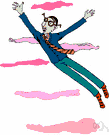fan·ta·sy
(făn′tə-sē, -zē)n. pl. fan·ta·sies
1. The creative imagination; unrestrained fancy.
2. Something, such as an invention, that is a creation of the fancy.
3. A capricious or fantastic idea; a conceit.
4.
a. A genre of fiction or other artistic work characterized by fanciful or supernatural elements.
b. A work of this genre.
5. An imagined event or sequence of mental images, such as a daydream, usually fulfilling a wish or psychological need.
6. An unrealistic or improbable supposition.
7. Music See fantasia.
8. A coin issued especially by a questionable authority and not intended for use as currency.
9. Obsolete A hallucination.
adj.
Relating to or being a game in which participants act as owners of imaginary sports teams whose personnel consists of actual players selected from a professional sports league and team performance is determined by the combined statistics of the players.
tr.v. fan·ta·sied, fan·ta·sy·ing, fan·ta·sies
To imagine; visualize.
[Middle English fantasie, fantsy, from Old French fantasie, from Latin phantasia, from Greek phantasiā, appearance, imagination, from phantazesthai, to appear, from phantos, visible, from phainesthai, phan-, to appear, passive of phainein, to show; see bhā- in Indo-European roots.]
American Heritage® Dictionary of the English Language, Fifth Edition. Copyright © 2016 by Houghton Mifflin Harcourt Publishing Company. Published by Houghton Mifflin Harcourt Publishing Company. All rights reserved.
fantasy
(ˈfæntəsɪ) orphantasy
n, pl -sies
1.
a. imagination unrestricted by reality
b. (as modifier): a fantasy world.
2. a creation of the imagination, esp a weird or bizarre one
3. (Psychology) psychol
a. a series of pleasing mental images, usually serving to fulfil a need not gratified in reality
b. the activity of forming such images
4. a whimsical or far-fetched notion
5. an illusion, hallucination, or phantom
6. a highly elaborate imaginative design or creation
8. (Literary & Literary Critical Terms)
a. literature having a large fantasy content
b. a prose or dramatic composition of this type
9. (modifier) of or relating to a competition, often in a newspaper, in which a participant selects players for an imaginary ideal team, and points are awarded according to the actual performances of the chosen players: fantasy football.
vb, -sies, -sying or -sied
a less common word for fantasize
[C14 fantasie, from Latin phantasia, from Greek phantazein to make visible]
Collins English Dictionary – Complete and Unabridged, 12th Edition 2014 © HarperCollins Publishers 1991, 1994, 1998, 2000, 2003, 2006, 2007, 2009, 2011, 2014
fan•ta•sy
or phan•ta•sy
(ˈfæn tə si, -zi)n., pl. -sies, n.
1. imagination, esp. when extravagant and unrestrained.
2. the forming of mental images, esp. wondrous or strange fancies; imaginative conceptualizing.
3. the succession of mental images thus formed.
4. an imagined or conjured up sequence of events, esp. one provoked by an unfulfilled psychological need.
5. an abnormal or bizarre sequence of mental images, as a hallucination.
6. a supposition based on no solid foundation; illusion.
7. caprice; whim.
8. an imaginative or fanciful creation; intricate, elaborate, or whimiscal design.
9. a form of fiction based on imaginative or fanciful characters and premises.
v.i. 11. to form mental images; imagine; fantasize.
12. to write or play fantasias.
v.t. 13. to form mental images of; create in the mind.
[1275–1325; Middle English: imaginative faculty < Latin phantasia < Greek phantasía idea, notion]
Random House Kernerman Webster's College Dictionary, © 2010 K Dictionaries Ltd. Copyright 2005, 1997, 1991 by Random House, Inc. All rights reserved.
fantasy
Past participle: fantasied
Gerund: fantasying
| Imperative |
|---|
| fantasy |
| fantasy |
Collins English Verb Tables © HarperCollins Publishers 2011
fantasy
A story involving things or happenings not known in real life.
Dictionary of Unfamiliar Words by Diagram Group Copyright © 2008 by Diagram Visual Information Limited
ThesaurusAntonymsRelated WordsSynonymsLegend:
| Noun | 1. |  fantasy - imagination unrestricted by reality; "a schoolgirl fantasy" fantasy - imagination unrestricted by reality; "a schoolgirl fantasy"imagination, imaginativeness, vision - the formation of a mental image of something that is not perceived as real and is not present to the senses; "popular imagination created a world of demons"; "imagination reveals what the world could be" pipe dream, dream - a fantastic but vain hope (from fantasies induced by the opium pipe); "I have this pipe dream about being emperor of the universe" fantasy life, phantasy life - an imaginary life lived in a fantasy world fairyland, fantasy world, phantasy world - something existing solely in the imagination (but often mistaken for reality) |
| 2. | fantasy - fiction with a large amount of imagination in it; "she made a lot of money writing romantic fantasies" fiction - a literary work based on the imagination and not necessarily on fact science fiction - literary fantasy involving the imagined impact of science on society | |
| 3. |  fantasy - something many people believe that is false; "they have the illusion that I am very wealthy" fantasy - something many people believe that is false; "they have the illusion that I am very wealthy"misconception - an incorrect conception bubble - an impracticable and illusory idea; "he didn't want to burst the newcomer's bubble" ignis fatuus, will-o'-the-wisp - an illusion that misleads wishful thinking - the illusion that what you wish for is actually true | |
| Verb | 1. |  fantasy - indulge in fantasies; "he is fantasizing when he says he plans to start his own company" fantasy - indulge in fantasies; "he is fantasizing when he says he plans to start his own company"conceive of, envisage, ideate, imagine - form a mental image of something that is not present or that is not the case; "Can you conceive of him as the president?" |
Based on WordNet 3.0, Farlex clipart collection. © 2003-2012 Princeton University, Farlex Inc.
fantasy
phantasy (Archaic)noun
1. daydream, dream, wish, fancy, delusion, reverie, flight of fancy, pipe dream Everyone's had a fantasy about winning the lottery
2. fairy tale, story, romance, fairy story, folk tale The film is more a fantasy than a horror story. imagination, fancy, invention, creativity, originality a world of imagination and fantasy
Collins Thesaurus of the English Language – Complete and Unabridged 2nd Edition. 2002 © HarperCollins Publishers 1995, 2002
fantasy
also phantasynoun
1. The power of the mind to form images:
2. Any fictitious idea accepted as part of an ideology by an uncritical group; a received idea:
3. A fantastic, impracticable plan or desire:
The American Heritage® Roget's Thesaurus. Copyright © 2013, 2014 by Houghton Mifflin Harcourt Publishing Company. Published by Houghton Mifflin Harcourt Publishing Company. All rights reserved.
Translations
خَيال، تَوَهُّم
fantaziepředstava
fantasifantasi-
FantasieFantasy
fantázia
draumórar; ímyndun, hugarburîur
fantazijaneįtikėtinaineįtikėtinas
fantāzijafantāzijas-
sanjarija
fantasy
[ˈfæntəzɪ] NCollins Spanish Dictionary - Complete and Unabridged 8th Edition 2005 © William Collins Sons & Co. Ltd. 1971, 1988 © HarperCollins Publishers 1992, 1993, 1996, 1997, 2000, 2003, 2005
fantasy
[ˈfæntəsi] n
(= dream) → fantasme m
(= imaginary work) (film, story) → fantaisie f
(= opposite of reality) → imagination f
modif
(= dream, ideal) [holiday] → de rêve
(= fantastical) [film, novel] → fantastique
to live in a fantasy world → vivre dans un monde imaginairefantasy football n → jeu m de l'entraîneur jeu dans lequel chaque participant constitue son équipe de football idéale avec des joueurs existants, les points étant marqués en fonction des performances réelles des joueurs choisis au cours de la saison
to live in a fantasy world → vivre dans un monde imaginairefantasy football n → jeu m de l'entraîneur jeu dans lequel chaque participant constitue son équipe de football idéale avec des joueurs existants, les points étant marqués en fonction des performances réelles des joueurs choisis au cours de la saison
Collins English/French Electronic Resource. © HarperCollins Publishers 2005
fantasy
n
(= illusion) → Fantasie f, → Hirngespinst nt (pej); that’s pure fantasy or a fantasy → das ist reine Fantasie or bloß ein Hirngespinst
(Mus, Liter) → Fantasie f
Collins German Dictionary – Complete and Unabridged 7th Edition 2005. © William Collins Sons & Co. Ltd. 1980 © HarperCollins Publishers 1991, 1997, 1999, 2004, 2005, 2007
fantasy
[ˈfæntəsɪ] n (imagination) → fantasia, immaginazione f; (fanciful idea, wish) → sogno, idea fantastica, chimerain a world of fantasy → in un mondo fantastico
Collins Italian Dictionary 1st Edition © HarperCollins Publishers 1995
fantasy
(ˈfӕntəsi) – plural ˈfantasies – noun an imaginary (especially not realistic) scene, story etc. He was always having fantasies about becoming rich and famous; (also adjective) He lived in a fantasy world.
fantastic (fӕnˈtӕstik) adjective1. unbelievable and like a fantasy. She told me some fantastic story about her father being a Grand Duke!
2. wonderful; very good. You look fantastic!
fanˈtastically adverbKernerman English Multilingual Dictionary © 2006-2013 K Dictionaries Ltd.
fan·ta·sy
n. fantasía, uso de la imaginación para transformar una realidad desagradable en una experiencia satisfactoria.
English-Spanish Medical Dictionary © Farlex 2012
fantasy
n (pl -sies) fantasíaEnglish-Spanish/Spanish-English Medical Dictionary Copyright © 2006 by The McGraw-Hill Companies, Inc. All rights reserved.